- Home
- Sharon Shinn
Wrapt in Crystal Page 5
Wrapt in Crystal Read online
Page 5
“They’re already there,” she called back. “I told them I’d hunt you up.”
“I’m flattered,” he said over his splashing.
He heard her laugh. “You’re the most fun we’ve had for months,” she replied.
Half an hour later, Drake and Lise had joined two other Moonchildren, both men, at a small, smoky restaurant called Papa Guaca’s. The capitan of the contingent was a small, taciturn, fine-featured man named Raeburn. Lise’s fellow sergeant was a fresh-faced boy about her age with the same easy camaraderie she possessed. His name was Leo Baskin.
“The convent murders,” Leo said, toasting Drake with a full glass of local wine. Drake had decided after the first glassful that it was as potent as anything he’d tasted.
“That’s what they call them?”
“That’s what the nonbelievers call them,” Lise said. “The faithful are calling them the holy murders, or words to that effect.”
“Any ideas?” Drake asked.
Raeburn gave him a cool look. “That’s what they imported you for,” he said.
Drake filed away the expression for later analysis. “I just got here,” he said. “I haven’t even met all the cast members.”
“Who have you talked to?” Lise wanted to know.
“Police chief, whatever his title is. Man named Benito.”
“He’s supposed to be okay,” she said. “Haven’t met him.”
“Woman at the Triumphante temple. Amica Jovieve.”
Lise and Leo exchanged glances. “La senya grande?” Lise said. “They must rate you pretty high.”
Drake paused with his glass halfway to his mouth. “She’s the senya grande?” he repeated.
“Sure. She didn’t mention it?”
“No. I just assumed she was the only person in the temple who spoke Standard Terran.”
“Don’t let that act fool you,” Leo snorted.
“It was probably true,” Raeburn interjected. “They aren’t big on the great brotherhood of Interfed here. On Semay, if someone says he can’t speak Standard Terran, he probably can’t.”
“So what’s she like?” Leo pressed. “She’s only, you know, the most powerful woman on the planet.”
“She was likable. Very smart but not obvious about it. I got the impression she was very shrewd about people—both their good sides and their bad.” Drake grinned suddenly. “I don’t know, if I had to describe her, I would say she reminded me of a French courtesan. Very worldly and very well-versed in the habits of men.”
“Not a bad analogy,” Raeburn said. “Make it the king’s mistress, and you’ll have a better picture.”
“Governor’s mistress,” Lise amended.
“Really?” Drake asked.
“Common speculation. Whether or not it’s true, she’s the power close to the throne. He doesn’t make a decision she doesn’t approve of.”
“I was given to understand secular and sacred power were always intertwined to a certain degree in Semay.”
“More these days than most,” Raeburn said dryly.
“Oh, who cares anyway,” Lise said. “I mean, his wife’s been dead forever.”
Leo prepared to fight with the readiness of someone who had had this argument before. “Well, if she’s the head of the church—of the most powerful church on the planet—”
“Religious doesn’t necessarily mean celibate,” she fired back.
“Certainly not with the Triumphantes,” he retorted. “Buncha whores, catting around Madrid.”
Drake jumped, but Raeburn was before him. “Mind your tongue in public, Sergeant,” the captain said in a low, hard voice, and Leo rolled his eyes but nodded.
“Mind your tongue period,” Lise said energetically. “Just because you come from some stern, pious, fanatical background—”
“The Serendans aren’t fanatical, but yes, certainly I believe that if a man or a woman is setting up as a moral example to the people—”
“And when’s the last century in which free love was considered immoral?”
“ ‘Free love,’ now there’s an expression I haven’t heard in a while,” Leo said mockingly.
“Well, you’re the one who’s acting like a throwback to some kind of Neanderthal civilization.” Lise, like Leo, was grinning widely. This sort of sharp byplay was considered so much easy after-dinner talk among restless young Moonchildren on assignment.
“If I could ask a stupid question,” Drake said. “And get a polite response. I’ve gathered that the Triumphantes aren’t exactly cold-blooded. Are you saying that some of the people of Semay—not just Leo here—consider that a fault on their part?”
“Mmm, well, a few,” Lise admitted. “Mostly the really devout Fideles. On the whole, I think it’s generally accepted that Triumphantes are priestesses but also women who occasionally take lovers. Their detractors call them godless abominations and so forth. You know the script.”
“And the Fideles? They are celibate?”
“As any good nun should be,” Leo said.
“General perception, yes,” Raeburn said. “I wouldn’t be surprised to learn there were a few lapses now and then. Human nature. But they certainly seem to aspire to higher moral ground than the Triumphantes.”
“Wonder which position our killer takes,” Drake mused. He felt the others exchange glances over his head, and looked up. “Well, if he feels like Leo does, it might make sense to kill the Triumphantes.”
“Jack the Ripper syndrome,” Lise said.
“Right. But to kill the Fideles too . . . doesn’t make sense from a moral point of view.”
“Killing for some other reason,” Raeburn said. “Some personal belief.”
“Right,” Drake said again. He didn’t add the thought uppermost in his mind: Every murder was committed from some personal belief or motive. The thief who killed the witness, the lover who killed in a rage, or the soldier who killed upon orders—all of them had a reason, or thought they did, for their actions. Finding the reason for this particular crime was his job.
* * *
* * *
Raeburn excused himself immediately when they returned to the hotel. Lise and Leo followed Drake hopefully to his room. “Come on in,” he invited them, and they happily accepted.
Leo, it turned out, had bought an extra bottle of wine as they were leaving Papa Guaca’s, and they found enough glasses lining the bathroom sink to serve the three of them. Drake waited until Leo was halfway through his drink before he asked questions.
“Tell me,” he said. “What’s Raeburn’s beef?”
Leo stretched his long legs out before him and leaned his head against the back of the wicker chair. “He doesn’t like Sayos,” he said. “He doesn’t think you need to be here.”
“He got time to solve the murders on his own? He’s had four months or more, hasn’t he?”
“He wasn’t really given the mandate. Governor Ruiso keeps him dancing up there at the palace, answering questions about Interfed and briefing him on diplomacy between nations. Ruiso will call him at any hour, literally, night or day, to have him answer some question on interplanetary relations. He didn’t want to lose his specialist to some kind of murder investigation.”
“Don’t misunderstand,” Lise said. “Raeburn loves the diplomatic stuff. And he’s good at it. But he’s worked really hard to convince Semay to hook up with Interfed, and he’s going to be irritated if Ruiso decides to go for it because of something you’ve solved, not because of something he’s managed.”
“What about you two? Did he want you on the investigation? If you’re his staff, and you solved the case, some of that glory would reflect on him.”
Lise grinned. “Ah, we’re peons,” she said. “Flunkies. We’re kept busy chauffeuring the governor around and running errands for Raeburn. We don’t have the smarts to solve such a terrible crime. Besides, it gives Ruiso a little
extra status to have a Sayo sent in when he asks for help. Makes him feel like Interfed really does consider him important.”
Drake swigged his wine. It seemed less potent now; that meant he had better watch himself. “So do you think the success of Raeburn’s mission hinges on me? That Semay will only decide to federate if I solve the mystery?”
“Be my guess,” Leo said. Lise nodded.
Drake took another swallow; the glass was empty. “Hope I’m as good as everyone thinks, then,” he said, and poured another glass.
* * *
* * *
In the morning Drake had only a small headache, usually the most severe form of hangover he ever suffered. Nonetheless, it irritated him. He couldn’t remember the last time he’d gotten drunk his first night on a new assignment.
Lise was waiting for him when he left his room. “Raeburn told me I should give you a ride this morning,” she said. “Isn’t that nice? We don’t have enough equipment to loan you a vehicle for your own personal use.”
“Maybe I’ll hire one,” he said, strolling down to the lobby beside her. “I’m going to need some mobility.”
“What can you handle?” she asked with interest.
He grinned. In the Moonchild forces, talents were diverse, but every single officer was either an engineering specialist or a first-class navigator, no matter what his primary specialty might be. Moonchildren spent so much time in space, on board the transgalactic liners, that they all had to know something about how to fly a spaceship or how to service it. Engineers as a rule prided themselves on their ability to understand all other kinds of equipment as well, but navigators were considered poor hands at managing anything except the great star cruisers.
“Bubble, scooter, small planetary craft, intermediate ship, star vessel,” he enumerated. “Jeep, truck, the whole range of land vehicles. What do you think I’ll find for rent?”
She grinned back. “Could have sworn you were a navigator,” she said.
“Am. But I can drive almost anything.”
“Well, your choices here are limited mostly to surface vehicles,” she said. “We’ve got a flier, but it’s issued to Raeburn and it’s restricted to emergency use. So Leo and I have been practicing our driving skills.”
The Moonchild jeep was parked in front, a sturdy, well-serviced jalopy that looked like it could cover any terrain with no fuss. Lise flicked on the power, then slid smoothly into light traffic. She drove courteously, but Drake guessed that she would love to take the car out onto the open road and open it up as fast as it would go.
“The Fidele temple, right?” she called to him over the hot wind blowing through the open windows. Drake nodded. “Far edge of town. Kind of a chancy district. Be careful walking home at night.”
He laughed aloud, and she grinned. “Yeah, I know. But don’t say I didn’t warn you.”
Even from the outside, the Fidele temple was an amazing contrast to the Triumphante sanctuary. It was smaller and much more stark, a spare multicolored building jostled in among other nondescript buildings on a street that looked like it had never seen better days. The stone of the temple appeared to have been donated by any number of benefactors, none of whom had agreed on material or color, so that white marble columns supported pink granite archways and black mica stones bordered the graveled walkway. There were no graceful fountains playing before the unassuming entrance; no statuary; no trees. Unprotected in the merciless sunlight, the temple looked small and hot and poor.
“Not a prepossessing home for the second most powerful religious faction on the planet,” Drake murmured as Lise pulled to a halt.
“The Fideles are ascetics, not aesthetes,” Lise told him so promptly that he was sure she had read the line somewhere. “They believe in inner beauty.”
“Clearly,” he said, and swung down from the jeep. “Thanks for the lift.”
She paused before shuffling the car back into drive. “Dinner tonight again?”
“If I’m back in time.”
“Why wouldn’t you be?”
He grinned. “I’m working, remember?”
“So am I, Lieutenant. We’ll save you some wine.” And she was gone.
It was still relatively early morning, but the sun was blazingly hot overhead. During the short walk up the ragged pathway, Drake’s eyes were nearly blinded by the sun’s reflection off the building before him. He began to wonder if he would always be able to trust his perceptions in such a climate. There was no embroidered bellpull at the door. Instead, a cloth-bound hammer invited him to strike a small brass gong. He did so, and instantly admired the low, melodic boom that echoed back to him from the unlit interior. He laid aside the hammer and waited.
He waited only a few moments, but the sun was so hot that the minutes dragged; he was drugged by the heat. When a small, plain woman came to the door and spoke to him, he felt compelled to answer in hushed tones.
“Ermana Laura,” he said in that low voice. “Por-vore.”
She answered in the same quiet tones, in words that he could not understand. He gave her his name and showed her the wristbadge on his arm. “Hijo del Luna,” he tried. Son of the Moon. Moonchild.
Whether she understood him, or was simply too kind to leave him any longer in the sun, she nodded and gestured for him to follow her. As soon as he stepped inside, some of that terrible torpor left him. It was cool and breathable inside the temple, though the ceilings were low and the air somewhat close. In the distance, as if from centuries away, he heard a woman’s voice raised in a heartbreaking aria. The smell of roses seemed to drift toward them from chambers farther down the hall.
His guide led him to a long, narrow room completely lined along the outside wall with arched windows. Indeed, so much of the room was open to the air that it qualified more as a porch than a room. The angle of the sun was behind it so that the high arches admitted a faint breeze and only refracted light, though that was plenty. The windows gave out onto a small garden that consisted mainly of a low, mossy furze and a few wildflowers that would not need much tending.
“Se senta,” his guide told him, pointing to one of two facing stone benches. He thought she was telling him to be seated. She turned to go.
“Ermana Laura?” he repeated somewhat urgently.
“Si, si,” was the impatient response, and then she was gone.
He did not sit. He stood before the nearest arched window and gazed out upon the small patch of green. He did not suppose it was watered often; therefore, it must be some hardy desert weed that survived on whatever moisture Ava deigned to send it. Twenty yards beyond it was a rusty fence enclosing what looked like a junkyard. Drake could barely discern two large black dogs lying in the poor shade afforded by some discarded household machine. The sweet, sad strains of the singer still troubled his ears, though the notes seemed fainter from here.
Crisp footsteps tapped down the stone floor. He turned quickly. The outside sunlight had blinded him; all he could see coming toward him was a blurred white outline, bright as the light outside and just as indistinct. The apparition put out a hand as she approached and light streamed down her arm. She was dressed in white and she reflected the diffused sunlight. The morning rays put a halo around her blond hair.
“Lieutenant Drake?” she said, and her voice was low and sweet. “I’m Laura. I hope you weren’t waiting long.”
He held her hand until he could bring her face into focus. It was plain to the gaze, for her pale hair was drawn severely back from her face, leaving all its angles and planes unadorned. On another woman, the high cheekbones and sloping jaw would have laid the foundations for beauty. On her, they merely accentuated the starkness of her hair, her dress, her expression. Her eyes were an unfathomable green, utterly still, watching him. She waited with an unbreakable serenity for him to speak.
“No,” he said. “I’ve been admiring your garden.”
She smiled and pulled her ha
nd away. “A gift from the city,” she said. “It was planted and is maintained by volunteers from the mayor’s office. The greenery makes this the most pleasant view from the temple.”
She did not apologize for its sparseness or decry the waste of human energy on something as useless as a garden. He liked her for both those omissions. “I’m Cowen Drake,” he said.
“You are the Moonchild who is here to investigate the murders.”
“Yes. Do you have time to talk to me now?”
“Yes, whenever you wish. I have sent Beth to bring us water.”
“Good. I have some questions.”
They sat, and the sunlight seemed to follow her down. Drake, having just learned the Triumphante method of naming its novitiates, thought that her name broke down just as truly: L’Aura. The Light. An individual ray broke past the stone and lit the smooth oval of crystal she wore on a plain black cord around her neck. For a moment, fire flared around her cheekbones and then faded.
“I am sorry about the deaths,” he said, beginning somberly and by saying something he had neglected to say to senya Jovieve.
“Yes,” she said quietly for the third time.
“And I apologize in advance for anything I do or say which may cause you distress. A murder investigation sometimes turns up things that are just as ugly as the crime.” As he spoke, he tried to guess her age, but with little success. By her face, she would be in her mid-thirties, but her eyes made her look far older.
“I live and work in what you call—a slum? a ghetto?—Lieutenant,” she said, still calmly. “I believe I have seen the extent of human ugliness.”
He pulled out and activated his recorder. “Do you mind?”
“No, of course not.”
“Tell me, please, about the women who were killed.”
“What do you wish to know?”
“What they were like, how long they had been with you, where they came from.”
“Jan was an older woman. Perhaps sixty, it is hard to say. She was the first to be killed—the first of ours. The Triumphante woman was the first. Jan was in a poor section of town, where there are often crimes of violence, but never before one against a holy woman. She was delivering loaves of bread to a family where there was illness.”

 Jenna Starborn
Jenna Starborn Troubled Waters
Troubled Waters The Thirteenth House
The Thirteenth House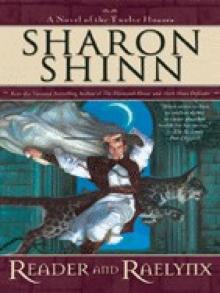 Reader and Raelynx
Reader and Raelynx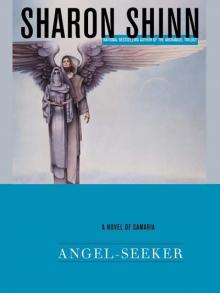 Angel-Seeker
Angel-Seeker Archangel
Archangel Jeweled Fire
Jeweled Fire Nocturne
Nocturne The Shape-Changer's Wife
The Shape-Changer's Wife Still Life With Shape-Shifter
Still Life With Shape-Shifter Quatrain
Quatrain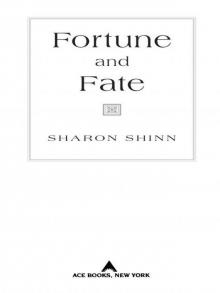 Fortune and Fate
Fortune and Fate Angelica
Angelica Summers at Castle Auburn
Summers at Castle Auburn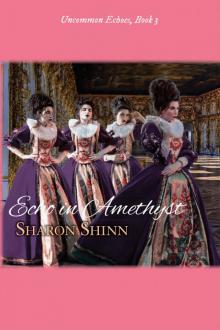 Echo in Amethyst
Echo in Amethyst The Turning Season
The Turning Season Mystic and Rider
Mystic and Rider Heart of Gold
Heart of Gold The Shape of Desire
The Shape of Desire Echo in Onyx
Echo in Onyx Royal Airs
Royal Airs Gateway
Gateway The Safe-Keeper's Secret
The Safe-Keeper's Secret Wrapt in Crystal
Wrapt in Crystal Unquiet Land
Unquiet Land Jovah's Angel
Jovah's Angel Dark Moon Defender (Twelve Houses)
Dark Moon Defender (Twelve Houses) Mystic and Rider (Twelve Houses)
Mystic and Rider (Twelve Houses)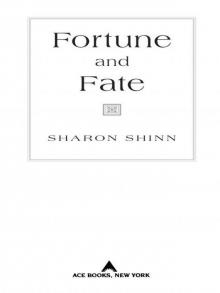 Fortune and Fate (Twelve Houses)
Fortune and Fate (Twelve Houses)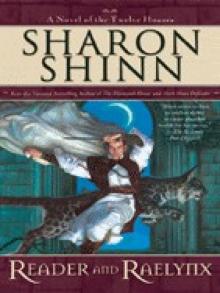 Reader and Raelynx (Twelve Houses)
Reader and Raelynx (Twelve Houses)